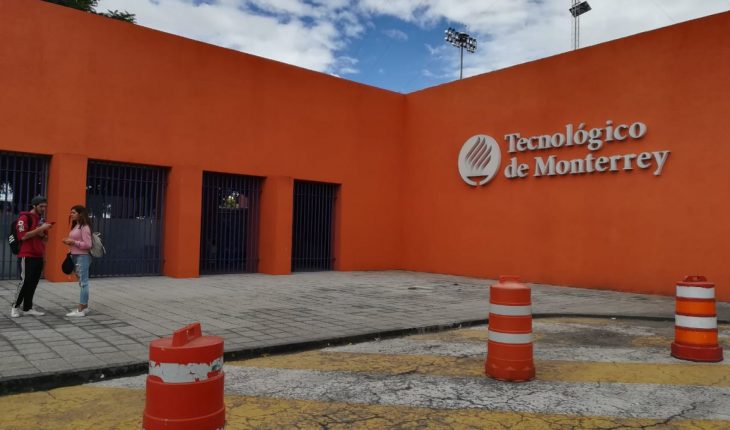Students of the Tecnológico de Monterrey raised their voices and organized more virtual protests after the educational authorities of that institution endorsed the creation of “Vitae”, a new student group that claims to promote ‘human dignity from fertilization to natural death’. That is, an anti-rights group, which is against women being able to decide about their bodies and resort to abortion, if they wish.
Faced with this claim, the institution announced in a statement that, as with other student groups, it will carry out “a review of its mission, vision and work plan, as well as the congruence between its value proposition and its public voices”; this without specifically saying whether or not it considers removing the validation from that group, with which it can, among other things, use the Tec facilities to organize events, or even have the endorsement of the institution to obtain sponsorships for its cause.
Read: Tec de Monterrey students protest in zoom against harassment; complaints protocol does not work, they denounce
“We recognize that we need to continue strengthening and correcting the process of student groups,” said the Tecnologico, one of the main educational institutions in the country, insisting that at all times it has sought to be a school that promotes tolerance “and diversity of ideas, as long as they occur in a framework of respect.”
Although according to students who signed a joint statement to express their rejection of Vitae, this case joins others in which they have not been heard, and where the Tec, they denounce, has instead put obstacles to the formation of student groups that promote reproductive rights of women, or LGBT people.
The institution says that dialogue is sought, but the feeling of the students is different
Asked about the different claims, the Tecnológico de Monterrey said that they are looking for “dialogue to be generated” among their students, as has happened in events such as the Feminist Days, where “expert voices have had the opportunity to take the floor and from different approaches.”
But according to the students, the reality is different.
“The TEC, and we students know it, has closed the door many times to have this type of discussion about abortion and has closed the door to the LGBT talk,” says Renata, who denounces that at the same time there are limitations for feminist groups.
“If in a certain way they are supporting a discourse that is extremely violent for us, then it is like going against everything they profess,” he says.
His opinion is not different from that of Samara, who emphasizes that other proposals of student groups have been put “obstacles”, so they fail to consolidate. While at the same time, limitations are established for groups that already exist and that position themselves in favor of the rights of women or the LGBT community.
“I can’t imagine how much anxiety or the amount of pain it can cause a person who is going through an unwanted pregnancy. To see these kinds of initiatives emerge and to see them be supported by the institution,” says Samara.
Other young women accuse that failures to deal with cases of harassment persist.
“They don’t listen to us and I have friends who have also reported harassment and it has come to nothing. Their complaint has been almost mistreated because they still see them crying and asking for help, and nothing is done, or if something like the slightest is done and also in the super slow, super tired, super stressful process, “says Betsaida.
The student also complains that they were not allowed to open a student newspaper, and that other pro-LGBT groups have been censored.
“They censor everyone, they don’t allow women to touch reproductive rights, they don’t let those in AIRE talk to high schools about sexuality,” she says. AIRE is an LGBT collective, which promotes inclusion.
The students state that if the existence and activities of this type of groups such as Vitae are allowed, other types of projects such as those that pronounce themselves in favor of the rights of women and pregnant people to decide on their bodies, safe abortion and sex education with a gender perspective should also be given an opportunity.
In the face of criticism, the president of the new student group, Cynthia C., denied to Animal Político that it was a group that spreads pro-partum or “pro-life” ideas, and that its work agenda is focused on supporting all people “born and unborn.”
“It’s a student group that came from the idea that at Tec we talk a lot about human dignity, about human sense, but very rarely do we feel that as a community we really do something for the dignity of all people,” he said.
Despite this the vice presidentThe Vitae entity declared on its Twitter that it was the “first pro-life student group of tec de Monterrey.”
Cynthia C. also denied that this semester they had “planned to touch on the issue of abortion.” But, in contrast, in social networks they define themselves as a group that defends dignity from fertilization.
Protests against omission
On Monday, September 6, the students called to protest using the hashtag #tecantiderechos, and ask people to share their opinions about allowing the creation of a student group that goes against women’s reproductive rights.
In addition, they invited the students to use Wallpapers on Zoom during classes, with legends such as “Era azul Tec, no azul anti-rights” and “Tec no toleres la intolerancia”, or “Tec respects my rights”.
Monday’s protests took place on the same day that the SCJN discussed and positioned itself mostly in favor of legal abortion in Coahuila, while in Texas it has just been repressed.
It is not the first time that the students of tec de Monterrey have to resort to virtual protests to demand the institution’s support for their rights. Exactly one year ago, the students reported cases of harassment and declared that the institution’s protocol for addressing gender-based violence was not working.
The Institution, in response to the protests of the students, revised the Protocol of Attention to Gender Violence and published a new version in November 2020.
She also joined the United Nations UNiTE campaign to end violence against women, and carried out the “strengthening” of training, sensitization and training in gender perspectives.
These omissions in terms of gender and human rights that the students of the institution have described, led the student body to form the feminist alliance Grito Violeta, a collective that was formed a year ago after the revelation of the cases of harassment.
The Violet Scream Alliance pronounced in its statement its disagreements after the approval of the student group Vitae. This statement has been signed by 124 groups and associations, and 6,127 students. Among other points, they demand that the Tecnológico be consistent with its ideals, since it committed to promoting the 2030 agenda of the United Nations and defending the rights of women.
Why is the existence of a group like Vitae worrisome?
“These people who formed this student group (Vitae) tomorrow will be professionals who discriminate on the basis of gender and who deny a human right or a right to access public health. Isn’t it alarming?”, asks Claudia San Andrés, activist of ALTO, Asociación Civil feminista regiomontana.
International organizations such as the WHO have already pointed out on several occasions that “abortion in dangerous conditions endangers the lives of a large number of women and represents a serious public health problem, since it is the poorest and youngest women who are most at risk.”
In fact, it highlights that “most deaths and health problems are preventable by improving access to adequate care services, including family planning methods and obstetric care.”
For the activist, there is a contradiction between the institutional discourse of the TEC and its actions. “This tolerance of anti-rights groups gives a bad signal and emphasizes the urgency of the gender perspective in the bowels of the institution, something is not right, it is a red, very red light, a warning sign,” he says.
He also stresses that access to sex education is essential, and that “the only thing that is achieved with this type of discourse is to blind and deny access to this information to people.”
Ensuring universal access to sexual and reproductive health and reproductive rights are part of the 2030 agenda promoted by the UN.
“Women’s human rights include their right to have control over and decide freely on issues relating to their sexuality, including their sexual and reproductive health, without being subject to coercion, discrimination and violence.”
What we do at Animal Político requires professional journalists, teamwork, dialogue with readers and something very important: independence. You can help us keep going. Be part of the team.
Subscribe to Animal Político, receive benefits and support free journalism.#YoSoyAnimal





